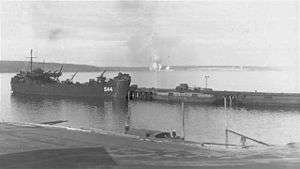USS LST-544
USS LST-544 was a United States Navy LST-542-class tank landing ship in commission from 1944 to 1946.
 USS LST-544, at left, moored at United States Naval Magazine, Indian Island, Washington, with smoke from the Port Townsend, Washington, paper mill in the background. | |
| History | |
|---|---|
| Name: | USS LST-544 |
| Builder: | Missouri Valley Bridge and Iron Company, Evansville, Indiana |
| Laid down: | 8 December 1943 |
| Launched: | 4 February 1944 |
| Sponsored by: | Mrs. Maudie M. Marlow |
| Commissioned: | 16 March 1944 |
| Decommissioned: | 9 August 1946 |
| Stricken: | 25 September 1946 |
| Fate: | Sold for scrapping 23 June 1947 |
| General characteristics | |
| Class and type: | LST-542-class tank landing ship |
| Displacement: | |
| Length: | 328 ft (100 m) |
| Beam: | 50 ft (15 m) |
| Draft: |
|
| Propulsion: | Two diesel engines, two shafts, twin rudders |
| Speed: | 12 knots (22 km/h; 14 mph) |
| Range: | 24,000 nautical miles (44,448 kilometerss) at 9 knots while displacing 3,960 tons |
| Boats & landing craft carried: | 6 x LCVPs |
| Capacity: | 1,600-1,900 tons cargo depending on mission |
| Troops: | 14 officers, 131 enlisted men |
| Complement: | 9 officers, 120 enlisted men |
| Armament: | |
Construction and commissioning
LST-544 was laid down on 8 December 1943 at Evansville, Indiana, by the Missouri Valley Bridge and Iron Company. She was launched on 4 February 1944, sponsored by Mrs. Maudie M. Marlow, and commissioned on 16 March 1944.
Service history
LST-544 was not involved in combat operations during World War II.
Decommissioning and disposal
LST-544 was decommissioned on 9 August 1946 and stricken from the Navy List on 25 September 1946. On 23 June 1947, she was sold to Willamette Iron & Steel Company for scrapping.
gollark: > do people have these problems in other countries?In the UK, we have *different* problems.
gollark: Meh, I turn that off anyway because it seems to be more "Microsoft-approved boot" than *secure* boot. Unless you bother to set your own keys, I guess.
gollark: No, I did, several times.> The data/body can be large, contain arbitrary bytes, and is actually meant to store large amounts of data.> - servers may allocate limited-sized buffers for incoming request headers so you can't put too much in them (this is somewhat problematic for cookies)> request bodies can probably be handled more performantly because of stuff like the length field on them> - request bodies are generated by forms and all sane clients so stuff is mostly designed to deal with those
gollark: I did say multiple times why that's not really a good idea.
gollark: You can put large amounts of data in the body. That's what it's for. File uploads and stuff go in it.
References
- This article incorporates text from the public domain Dictionary of American Naval Fighting Ships. The entry can be found here.
- NavSource Online: Amphibious Photo Archive LST-544
This article is issued from Wikipedia. The text is licensed under Creative Commons - Attribution - Sharealike. Additional terms may apply for the media files.